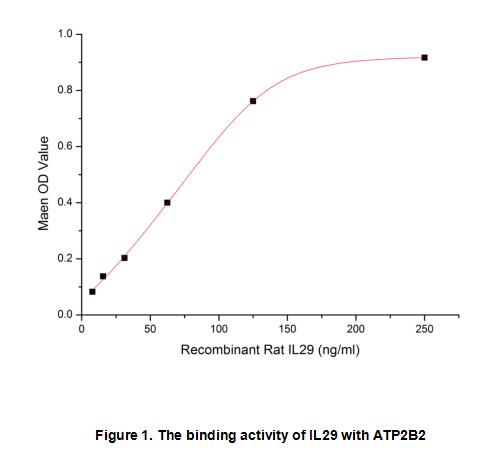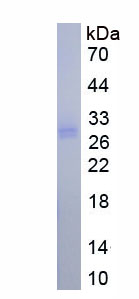Active Interleukin 29 (IL29) 

IFNL1; IFN-λ1; Interferon Lambda 1; Cytokine Zcyto21
- UOM
- FOB US$ 280.00 US$ 700.00 US$ 1,400.00 US$ 4,200.00 US$ 10,500.00
- Quantity
Overview
Properties
- Product No.APC029Ra61
- Organism SpeciesRattus norvegicus (Rat) Same name, Different species.
- ApplicationsCell culture; Activity Assays.
Research use only - DownloadInstruction Manual
- CategoryCytokineInfection immunity
- Buffer FormulationPBS, pH7.4, containing 0.01% SKL, 1mM DTT, 5% Trehalose and Proclin300.
- Traits Freeze-dried powder, Purity > 90%
- Isoelectric Point8.9
Sign into your account
Share a new citation as an author
Upload your experimental result
Review

Contact us
Please fill in the blank.
Activity test

Interleukin-29 (IL-29) is a member of the helical cytokine family and is a type III interferon. It is also known as IFNλ1 and is highly similar in amino acid sequence to the IL-28, the other type III interferon. IL-29 plays an important role in host defenses against microbes and its gene is highly upregulated in cells infected with viruses. Besides, ATPase, Ca Transporting, Plasma Membrane 2 (ATP2B2) has been identified as an interactor of IL29, thus a binding ELISA assay was conducted to detect the interaction of recombinant human IL29 and recombinant human ATP2B2. Briefly, IL29 were diluted serially in PBS with 0.01% BSA (pH 7.4). Duplicate samples of 100μl were then transferred to ATP2B2-coated microtiter wells and incubated for 2h at 37 ℃. Wells were washed with PBST and incubated for 1h with anti-IL29 pAb, then aspirated and washed 3 times. After incubation with HRP labelled secondary antibody, wells were aspirated and washed 3 times. With the addition of substrate solution, wells were incubated 15-25 minutes at 37℃. Finally, add 50µL stop solution to the wells and read at 450nm immediately. The binding activity of IL29 and ATP2B2 was shown in Figure 1, and this effect was in a dose dependent manner.
Usage
Reconstitute in 10mM PBS (pH7.4) to a concentration of 0.1-1.0 mg/mL. Do not vortex.
Storage
Avoid repeated freeze/thaw cycles. Store at 2-8°C for one month. Aliquot and store at -80°C for 12 months.
Stability
The thermal stability is described by the loss rate. The loss rate was determined by accelerated thermal degradation test, that is, incubate the protein at 37°C for 48h, and no obvious degradation and precipitation were observed. The loss rate is less than 5% within the expiration date under appropriate storage condition.
Increment services
-
 BCA Protein Quantification Kit
BCA Protein Quantification Kit
-
 Molecular Mass Marker for Protein
Molecular Mass Marker for Protein
-
 Monoclonal Antibody Customized Service
Monoclonal Antibody Customized Service
-
 Polyclonal Antibody Customized Service
Polyclonal Antibody Customized Service
-
 Protein Activity Test Experiment Service
Protein Activity Test Experiment Service
-
 Electrophoretic Mobility Shift Assay (EMSA) Experiment Service
Electrophoretic Mobility Shift Assay (EMSA) Experiment Service
-
 Buffer
Buffer
-
 Lentivirus Packaging Experiment Service
Lentivirus Packaging Experiment Service
-
 Adenovirus Packaging Experiment Service
Adenovirus Packaging Experiment Service
-
 Real Time PCR Experimental Service
Real Time PCR Experimental Service
-
 Spike RBD Protein (S-RBD)
Spike RBD Protein (S-RBD)
-
 Protein G
Protein G
-
 Protein A
Protein A







